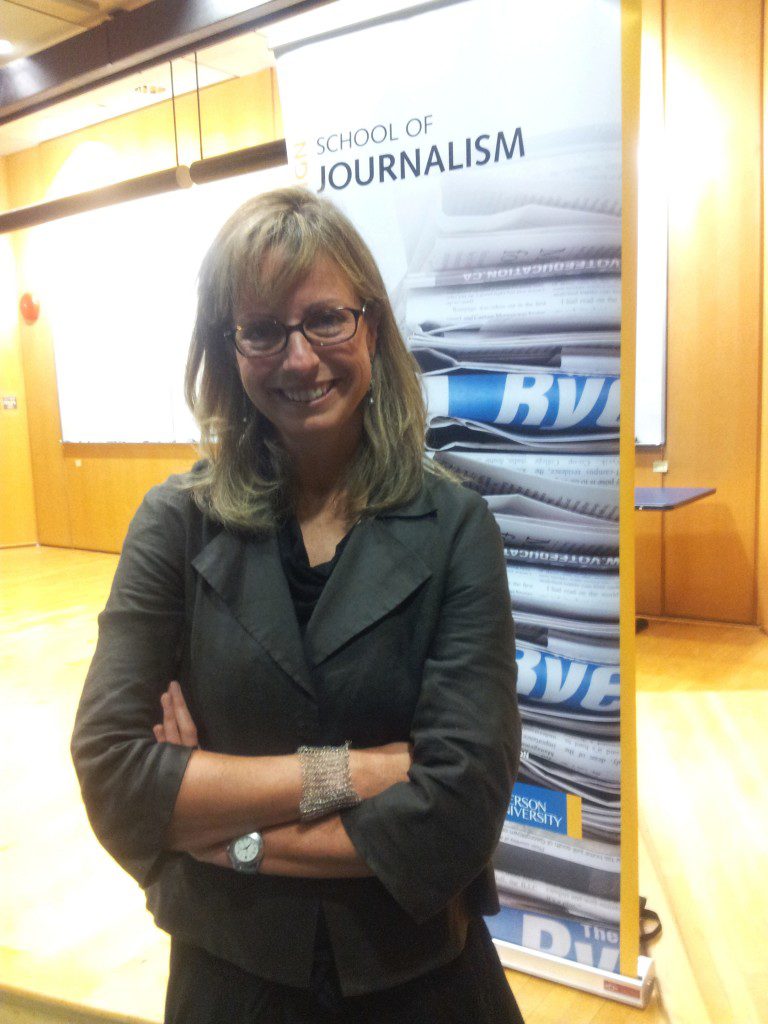By JACKIE HONG
STAFF REPORTER

Toronto Star reporter Michelle Shephard has seen the slums of Mogadishu and covered the results of the Kenyan federal elections. She’s visited the notorious prison grounds of Guantanamo Bay, witnessed the smouldering remains of Ground Zero in New York City hours after planes flew into the World Trade Center, and told the Arab Spring story as it unfolded on the streets of Yemen.
Shephard shared these stories and more with about 100 students, staff and fellow journalists as this year’s Atkinson Lecture. In an April 11 address that lasted for more than an hour, the 1996 Ryerson journalism graduate spoke about her experiences reporting on the national security beat she created, and reflected on how technology has changed journalism over the years.
“I have the best job in journalism,” said Shephard, who was hired by the Toronto Star in 1997. “We’re expected to do more now, but that’s okay. I embrace it… But I do hope the speed at which we’re expected to deliver news never compromises the accuracy or quality.”
In the past, Shephard said, she would work on one story a day. These days, however, she is constantly multitasking. While covering the Kenyan elections last year, for instance, she filed up to three stories a day, all the while tweeting, updating Facebook, and taking pictures. She attributed the change to the advent of new technologies and the financial problems that have caused newspapers to cut back on sending large teams overseas and on foreign bureaus.
Shephard spoke about the challenges of a beat that requires reporting in risky situations where the protection of armed guards is a necessity.
“Foreign reporting has changed. Before 9/11, you might have been caught in the crossfire but today, you’ve become the target,” she said.
She also described the extreme censorship she and other journalists ran into while reporting during more than two dozen visits to Guantanamo Bay. The strict rules imposed by the American military on what can and cannot be reported means that all photographs are screened, she said, noting that the list of forbidden images includes shots of the ocean surrounding the base.
“We’ve argued that, ‘We think that Al-Qaeda know that Cuba is an island,’” Shephard said, calling some of the conditions “ridiculous.”
Shephard had harsh words for the Canadian government’s penchant for secrecy, observing that she finds it “the most frustrating country to report in.”
“I’ve had more transparency in Somalia,” she said.
Somalia was where Shephard first met Ismail Khalif Abdulle, a boy who had one of his feet and a hand amputated by the terrorist group Al Shabab when he refused to join its ranks. After Shephard wrote about him, Somalians in Toronto launched a project to get Abdulle out of the country. He was smuggled into Kenya, where the United Nations declared him a refugee, and a few weeks later, he was sponsored by a family in Norway.
“He’s doing very well now,” Shephard said with a smile. “Every time I look at his Facebook pictures, he always has two beautiful Norwegian girls on either side of him.”
The Atkinson Lecture is an annual talk sponsored by the Atkinson Charitable Foundation. It features Canadian speakers who focus on social justice, human rights, and government.
